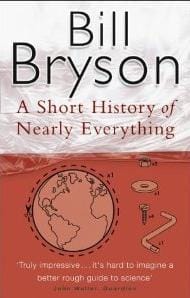In the past five years, I’ve reviewed 59 books on this blog so far. Without exception, they have all been works of fiction. Indeed, I rarely read anything non fictional. After all, I have newspapers and articles for that. “A short history of nearly everything” by Bill Bryson wormed its way into my hands and I never even intended to read it fully. But from the first paragraph, I just kept reading. And before I knew it, I turned the last page! Rarely have I ever been so gripped by a semi scientific book. I’ve read “A brief history of time” and a few others like it which attempt to give non professionals a glimpse into the world and they were great. But nothing like this book.

I was reading “The Diamond Age” before this, which I will now proceed to finish. I saw this book at a friend’s house and casually picked it up. I decided to get my own copy and before I knew it, I had put the other book aside. The title pretty much tells it all. It is indeed a “short history of nearly everything.” It attempts to give an overview of today’s state of science in the most important fields. It’s written for the layperson but even someone like me with a lifelong interest in Physics, Biology, Astronomy and Chemistry found a lot of things I didn’t know and which blew my mind away.
The highlight is that it’s written from the perspective of a novice. So instead of just giving for example the layout of the solar system, it puts it in perspective. Many of us think of our planets as circling around the sun one after the other – all neatly represented on a single page of a physics textbook. What even I didn’t know was the scale. For example, if the sun is the size of a pea or so, then Pluto – the farthest planet – is almost 100 kms away! And that’s just the start.
And this is one of the selling points of this book. It explains large numbers and compares things in terms we can understand. Another example depicts for how short a time we humans have been on earth. Stretch your arms as wide as they can go and that that is the lifespan of the Earth. What timescale does humanity represent? Take a nail file on a nail clipper and file it once over the edge of the nail of your middle finger. The amount of material which comes off is equivalent to all of human existence!
Here’s another example of a quote from the book:
Atoms are also fantastically durable. Because they are so long lived, atoms really get around. Every atom you possess has almost certainly passed through several stars and been part of millions of organisms on its way to becoming you. We are each so atomically numerous and so vigorously recycled at death that a significant number of our atoms – up to 200 billion for each us, it has been suggested – probably once belonged to Shakespeare.
Instead of giving bare and dry facts, it presents the sum of what we know all too briefly in an engaging manner the way a child would see it. No question is too stupid since it’s actually the stupid questions which hold the most value. Want to get a kid interested in science? This book will get them engaged and hooked, though as a former child, I know that forcing one to read something is sufficient reason to put them off it forever.
If you’re an adult and have never thought of scientific matters before, it’s not too late! I guarantee that any intelligent human cannot fail to be moved. Our world and universe is a wonderful, astounding, and terrifying place. After reading this, you’ll probably wonder at our zombie like existence day in and day out – unaware of the reality we live in. You’ll wonder why we don’t just keep screaming “Oh my God, oh my God!”
The high this book generates is too intense for it to last for long. But take it from me – you’ll never view anything in the same way ever again. If music could express how one feels, this music sums it up:

Fascinating. Let me check if this book is available on Flipkart.
The pea and a hundred kilometers blew my mind.
In reply to indianhomemaker
It’s available it seems. But too expensive I feel for me to buy it in India like that! Prefer to read digital copies on my Kindle.
Yup…that is a good book. Other books of a similar nature that you might find interesting
Death from the skies by Phil Plait – A fun book about the many different ways in which the universe can destroy us ; from an astronomy standpoint
The Five Ages of the Universe by Fred Adams – This book deals with the age and evolution of the universe so far and also predicts (from a cosmological standpoint) how the universe will continue to evolve and die well beyond 10^100 years. Very interesting concepts but a very rare book to get our hands on.
Big Bang by Simon Singh – The story of how we arrived at the Big Bang Theory and the evidence supporting it
Why Evolution is True by Jerry Coyne – The story of the vast array of irrefutable evidence supporting evolution
…and many, many more.
Happy reading!
Looks very interesting. On my wishlist now!
I have heard a lot about the book!! will check it out on flipkart.
I read this book close to 6 months back, and I feel the EXACT same way lol. Been recommending this book to everyone ever since.